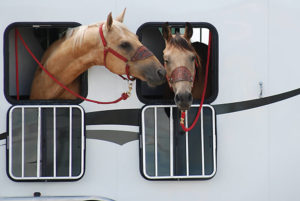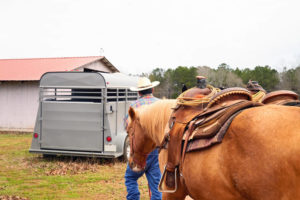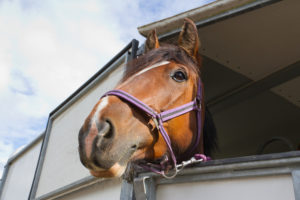Whether you’re moving south for the winter or bringing another four-legged family member home to your farm for spring, you will have to consider transportation for your horse. The more preparation that goes into trailering your horse, the easier and safer the travel will be.
Below is a list of five important tips to consider before trailering your horse:

1. Documentation
Horses should be up to date on all vaccinations and worming. You must carry the proper records of health and immunizations when traveling across state lines with your horse. The laws are different for each state and are subject to change, so make sure to do your research and organize the documents appropriately. Each horse should travel with at least a recent Health Certificate and a negative Coggins test. Communicate with your vet to ensure he or she can assist in providing the correct documentation in time for your trip.
2. Trailer setup
No matter how long the trip, you should always double-check the condition of the truck and trailer. Look at the hitch and tire pressure, and ensure there is no rust or signs of wear. The truck should have working lights connected to the trailer, a full tank of gas, and all engine-related maintenance in order. The stalls should be well bedded and low in dust, as respiratory problems can develop from dusty bedding in a confined area. Make sure to include extra jugs of water and bales of hay inside the trailer, as well as an emergency first-aid kit. A good tip for trailering one horse in a two-horse trailer is to always load the horse on the left (driver) side. This is done because of the way roads are constructed with a crown to help drain water to the outside of the road. By doing this it keeps the weight on the high side of the road and counterbalances the lower, lighter side.
3. Equipment
Depending on the length of the trip, you may consider wrapping your horse’s legs in standing bandages or shipping boots. These can help protect from minor cuts and swelling, and they provide support. Make sure to check for rubs or irritation during your breaks. Some may elect to skip the wraps for particularly long trips due to the risk of them becoming undone or loose. You may also choose to use a shipping halter to protect the horse’s face. Depending on the time of the year, it may be necessary to blanket your horse. However, please remember that horses can get hot very easily while trailering, so in many cases “less is more”!
4. Fitness
Trailering your horse is physically and emotionally demanding on horses, so they should be fit for the trip. We can all be subject to a compromised immune system when traveling, so consider an equine supplement, such as Spirulina Wafers, to help provide extra vitamins and minerals to support a horse’s healthy immune response. Each horse should have access to adequate food and water during the trip. It is common to hang a hay net, making sure to tie it in a way that does not risk getting tangled with the horse if they empty it. Try to stop every 2 to 3 hours to offer your horses water, refill hay nets, and check their wraps.
5. Keeping calm
It’s easy for horses to become stressed and dehydrated while on the road. If only we could communicate with them and tell them the travel plan! Depending on how much experience your horse has with traveling, you may consider using a natural calming supplement. Springtime’s Daily Calm contains ginseng to help the body’s normal response to stress without sedation.
Stress is an important factor to address, because it can contribute to severe weight loss, gastric ulcers, and dehydration — all conditions that will require time and energy to correct.

We must remember, it’s hardly natural for horses to waltz into a steel box and remain calm throughout the duration of the trip, which means they place a large amount of trust in their human counterparts to keep them safe. It is our responsibility as good horsemen and horsewomen to ensure we take every measure in our horse’s safety during transport.
*

